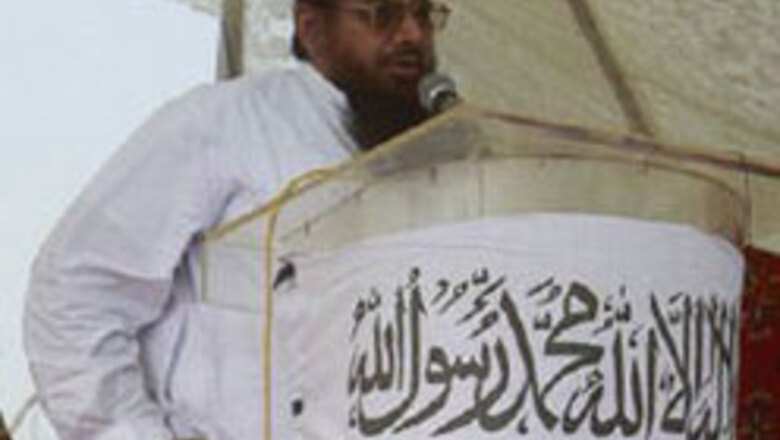
views
Lahore: The founder of a terrorist group blamed by India and US officials for the attack on Mumbai said on Thursday a UN decision to put him and the charity he heads on a terrorist list defamed Pakistan.
Hafiz Saeed led the Lashkar-e-Toiba jihadi group until December 2001, when he quit a few days before Pakistan complied with a UN move to put the group on a list of individuals and organisations with links to al Qaeda and the Taliban.
Saeed, one of the most wanted men in India, has since headed Jamaat-ud-Dawa, a charity analysts and diplomats regard as a front for Lashkar, the group Saeed founded in 1990 to fight Indian rule in Kashmir.
The Security Council added Saeed and his charity to a terrorist list on Wednesday after receiving a request from the United States. Three other Pakistanis associated with Lashkar were also put on the list, which sanctions a freeze on their assets and a ban on travel.
"We will not accept any decision taken under Indian pressure," Saeed told a news conference in the eastern city of Lahore. "This decision was taken to defame Pakistan." He denied the charity was engaged in terrorist activity and said there was no proof of its involvement in the attack on Mumbai at the end of last month.
Lashkar and other jihadi groups fighting in Kashmir have had close ties with the Pakistani military's Inter-Services Intelligence agency. Analysts say Indian doubts about the sincerity of Pakistan's actions are inevitable given these old links. Indian accusations of Lashkar's involvement in the slaughter of 179 people in Mumbai were partly based on the interrogation reports from the one gunman caught alive.
Rehman Malik, the head of Pakistan's Interior Ministry, said the government was deliberating what action to take against Jamaat-ud-Dawa in the wake of the UN decision. While the United States had put Jamaat-ud-Dawa on its list of designated terrorist organisations in 2006, Pakistan merely kept it on a watch list. Pakistani security forces have raided some JuD offices since Friday as well as at least one camp used by Lashkar fighters.
They arrested two Lashkar operations chiefs who had been named by India as planners of the attacks on Mumbai. Pakistan has said anyone arrested in Pakistan would be tried in the country. The United States has advised Pakistan to act swiftly and transparently to help India's investigation.
Pakistan, following the U.N.'s lead, banned both Lashkar and Jaish-e-Mohammad after they were blamed for an attack in December 2001 on the Indian parliament which almost sparked a fourth war between the South Asian neighbours.
Analysts say Pakistan's bans are ineffective because the intelligence agencies have allowed terrorist groups to survive so that they can be used as a weapon against India. If they are banned by the authorities the groups either simply change names, or their leaders take a low profile.
While Saeed was freely addressing a news conference in Lahore, there was uncertainty over the whereabouts of Maulana Masood Azhar, the head of Jaish. An intelligence official told Reuters that Azhar had been detained, but there was no other corroboration, and his status remains unclear.
The intelligence official said less than 20 people were being held following raids since Sunday, though other media has reported up to 40 arrests had been made. (Additional reporting by Zeeshan Haider)




















Comments
0 comment